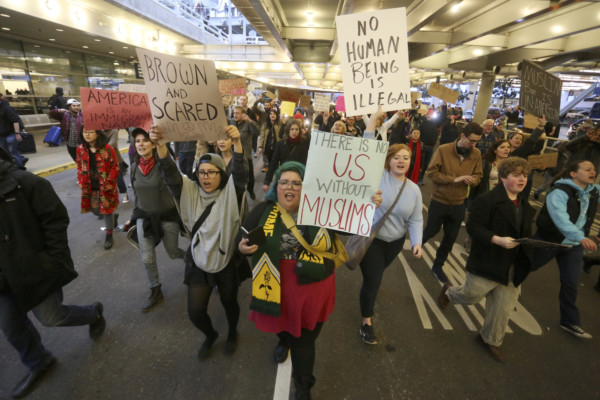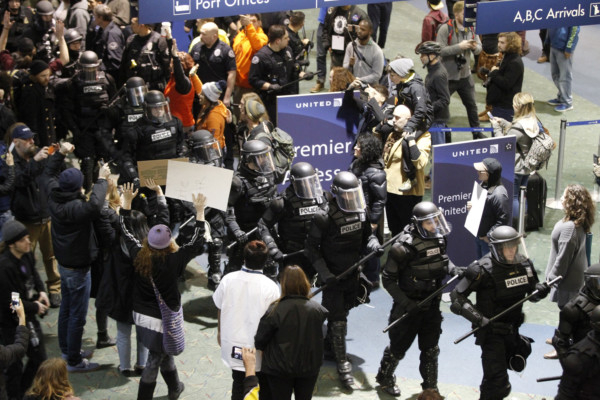
Washington: US President Donald Trump defended the immigration clampdown that sparked a global backlash over the weekend by blaming the confusion at airports on protesters and on a computer outage at Delta Air Lines Inc. that caused flight cancellations.
“Only 109 people out of 325,000 were detained and held for questioning. Big problems at airports were caused by Delta computer outage” and “protesters,” Trump said in a series of Twitter messages on Monday. Homeland Security Secretary John Kelly “said that all is going well with very few problems.”
The computer interruption at Delta didn’t begin until about 6:30pm New York time on Sunday, more than 48 hours after Trump signed the executive order that caused chaos at several US airports as everyone from travellers to airline gate crews to immigration officers were left to contend with conflicting edicts. Crowds of thousands gathered from New York to Atlanta to Detroit on Sunday to protest the travel restrictions.
The Department of Homeland Security late Sunday said permanent US residents from seven mostly Islamic countries covered by Trump’s order should no longer be detained at American airports and no one covered by the ban should be getting on planes overseas.
While Delta’s outage grounded about 170 flights, it lasted less than three hours and didn’t affect international flights. A Delta spokesman didn’t immediately comment.
Trump was defending an executive order issued two days earlier that sets new barriers to entry for people from Syria, Iraq, Iran, Sudan, Somalia, Yemen and Libya. Refugees, visa holders and permanent US residents were all among those affected, at least initially. But three US court orders were issued blocking parts of the plan and White House aides sought to minimise the impact of the order Monday after allies from the UK to Germany condemned the move and major international companies said it threatened to strangle the free flow of workers and commerce.
Besides defending the substance of the policy, Trump defended putting it into immediate effect. “If the ban were announced with a one week notice, the ‘bad’ would rush into our country during that week. A lot of bad ‘dudes’ out there!” the president said in another tweet Monday.
Trump compared his order to one issued by his predecessor, Barack Obama, and effectively told fellow Republicans who criticised him to mind their own business.
“This is not about religion — this is about terror and keeping our country safe,” Trump said in a statement Sunday pushing back against the international uproar that followed his action. “There are over 40 different countries worldwide that are majority Muslim that are not affected by this order.”
The fallout from the order was swift, compounded by the fact that few — including some of Trump’s own aides — seemed clear what was in it. Two of his top aides, strategist Steve Bannon and son-in-law Jared Kushner, had to get on the phone with British officials to walk them through it. Another Trump aide said the order added a new step to re-entry for some green-card holders. Yet another aide said the status of such permanent legal residents would be clarified later.
Late on Sunday, Kelly issued a statement declaring that the entry of green-card holders is in the national interest. He said such individuals would be allowed into the country barring any significant evidence that they pose “a serious threat to public safety and welfare.”
Trump adviser Kellyanne Conway said on CNBC Monday that there was a campaign of “misinformation” about the order.
“We are the most generous country in the world when it comes to our immigration policies but you have to go stand in line and you can’t be, at least for the next 90 days, a foreign national or a citizen of seven countries,” Conway said.
One Trump friend and adviser, Tom Barrack, said the president has indicated that the immigration order serves two purposes: one, to keep a potential terrorist out, but two to send a signal to the larger Middle East that the countries there need to take control of the situation at home and stop using a flood of refugees as a bargaining chip to pressure the West.
Given that Trump’s foreign policy team is only now taking shape, “it is just a way to push back with the only tool that he has, so he is giving a timeout while his team gets in place and then they will have a run at it,” Barrack said in an interview.
Trump views the order as the first step of what he has described as a “Marshall plan” for the Middle East, where he will help countries with US support in hopes of improving lives and putting as many as 60 million young people to work on electricity and other infrastructure projects, Barrack said. Trump made calls on Sunday to two US allies in the region — King Salman Bin Abdulaziz Al Saud of Saudi Arabia and His Highness Shaikh Mohammad Bin Zayed Al Nahyan, Crown Prince of Abu Dhabi and Deputy Supreme Commander of the UAE Armed Forces.
Amid the confusion over Trump’s order, the courts went into the breach, with no fewer than three federal judges seeking to block parts of it temporarily. The judges intended to prevent people stopped from entering the country from being sent back home, and to let most of those who were stopped enter the US. But they did little to clarify the state of the law going forward. White House officials insisted the rulings were moot because the travellers were processed as provided under the law.
Adding to the legal drama is the expectation that Trump will now name his Supreme Court nominee on Tuesday, setting the constitutionality of this order as a backdrop to what is sure to be a brutal confirmation battle with Democrats who joined the outcry against Trump’s move.
The human drama played out at airports across America, Europe and the Middle East, as officials struggled to interpret instructions that appeared to catch much of the US government by surprise.
At the same time, the potential implications began to set in for multinational companies. After an early outburst of anger by some American technology leaders — Apple’s Tim Cook, Facebook’s Mark Zuckerberg, Tesla’s Elon Musk — chief executive officers of other industries from finance to autos started to grapple with the order’s reach.
Jeff Immelt, General Electric Co.’s chairman and CEO, wrote in an internal email that GE has “many employees from the named countries” who are “critical to our success and they are our friends and partners.” GE, he said, would “continue to make our voice heard with the new administration.”
Trump’s move is “not a policy we support,” Goldman Sachs CEO Lloyd Blankfein said in a voicemail Sunday to employees. Seeing possible “disruption to the firm,” Blankfein said Goldman will work to help people and families affected. “Being diverse is not optional. It is what we must be,” he said.
Silicon Valley executives were more outspoken. Google CEO Sundar Pichai, an immigrant from India, called the policy “painful” and Microsoft Corp.’s Satya Nadella took to the company’s LinkedIn to highlight “the positive impact that immigration has on our company, for the country, for the world.”
Friday’s executive order suspended the admission of all refugees for 120 days and imposed a 90-day entry freeze for citizens of seven countries, from US ally Iraq to long-standing enemy Iran.
Two Republican senators, John McCain and Lindsey Graham, warned that the measure may not succeed. They said it risked spurring anti-American sentiment and turning into a “self-inflicted wound in the fight against terrorism,” questioning whether all the relevant government departments had been properly consulted.
The two also said they were “concerned by reports that this order went into effect with little to no consultation with the departments of State, Defense, Justice, and Homeland Security.”
Unsure of the rules, officials at airports everywhere played it safe. In Amsterdam and London, all US-bound travellers from the seven countries — the others are Syria, Sudan, Somalia, Yemen and Libya — were being turned away.
Sudan’s foreign minister, Ibrahim Ghandour, said the ban comes as the two countries started to work more closely to combat terrorism, and only two weeks after Obama lifted decades-old sanctions on the North African country.
The leaders of key American allies distanced themselves from Trump.
Canada’s Prime Minister Justin Trudeau said his country would welcome those fleeing persecution, “regardless of your faith.” German Chancellor Angela Merkel, who spoke to Trump on Saturday, expressed her concern that the fight against terrorism “doesn’t justify placing people of a particular origin or faith under general suspicion,” according to her chief spokesman Steffen Seibert. “We do not agree with this kind of approach,” UK Prime Minister Theresa May said of the immigration freeze on Sunday, two days after meeting with Trump in Washington.
In the UK, an online petition calling for Trump’s upcoming state visit to be cancelled had a million signatures — 10 times the number needed to trigger an almost-automatic debate in Parliament. Still, there’s no vote at the end of it and lawmakers don’t have the power to force May’s hand.













